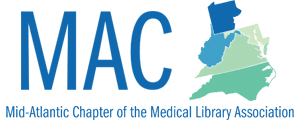MLA Quad Chapter: CE course opportunities
It’s time to start planning for the MLA Quad Chapters conference being held in beautiful Baltimore, Maryland from October 13 – 16th, 2012.
Here are the exciting CE opportunities that will be available. Be sure to sign up before September 21st when Early Bird registration ends to be sure to guarantee your space! Classes are expected to fill up!
For more information about the conference, please visit http://www.hshsl.umaryland.edu/quad2012/index.cfm!!
All CE Courses are on Saturday, October 13th
REGISTRATION FEES: Half Day Class – Member: $65.00 | Non-member: $90.00
Demystifying Molecular Biology
Instructors: Helen-Ann Brown Epstein &
Collette Saccomanno
8:00am – 12:00pm
Description:Get comfortable in your own DNA, RNA, and proteins…you’ll have a BLAST, and won’t want to BLINK as a librarian colleague who also holds a PhD in Molecular Biology gets to share her knowledge with a little humor and a lot of interaction. With concepts clear, take an Evidence-Based approach led by a librarian colleague expert searcher to interpret stories, fill in background knowledge, compose the searchable question and use NCBI and other electronic resources to find the answer. This course has been favorably received over the past three years including: MLA ’09, and in the New England Region of the National Network of Libraries of Medicine.
EBM: Introduction to Study Design and Critical Appraisal
Instructor: Connie Schardt
8:00am – 12:00pm
Description: One of the pillars of Evidence-Based Practice is that the better the research the more confident the decisions will be. Study design and critical appraisal help determine the quality of the research. This engaging course is designed to give learners an introduction to critical appraisal skills through an understanding of basic study designs and validity issues related to reducing bias in clinical studies. The course will focus on understanding the basic study designs in medicine (case-control, cohort, randomized controlled clinical trial, systematic review, and Meta analysis). Learners will also discuss the criteria for determining internal validity of therapy studies and systematic reviews. After completing this course, learners will be better able to: identify appropriate study designs; identify validity criteria; help support evidence-based medicine within their own institutions. Teaching methods will include discussion, case studies, group exercises, and practice in appraising articles.
Information Anywhere: Mobile Technology, Libraries and Health
Instructor: Max Anderson
1:00pm – 5:00pm
Description: This four-hour class is an overview of the plethora of mobile devices available today and how they impact libraries and medicine. We will discuss Apple products (including iPhone, iPod Touch, and iPad), Blackberry devices, and Google Android-powered phones. Popular uses and applications for these devices, with particular emphasis on those that make use of the products of the National Library of Medicine will be highlighted. Students will learn what it takes to create mobile applications and websites, and will participate in a hands-on activity to create a simple mobile website. After taking this class, you will: understand how mobiletechnologies are affecting how we deliver content; have the knowledge of how mobile websites and apps are developed; learn more about existing health-related and library mobile websites and apps; and understand QR codes and potential uses.
If you have a mobile device, please bring it! This includes tablets, smartphones, etc.
Instruction by Design: Creating Effective Instruction
Instructor: Veronica Bielat
1:00pm – 4:00pm
Description: What can librarians do, in our role as educators, to increase our instructional effectiveness? How can we deliver instruction that develops the information seeking and critical thinking skills our users need to navigate an increasingly complex world of information? In this participative course, we will:
o Explore instructional design models and how they apply to library instruction, especially one-shot sessions
o Talk about learning theory and how it can be used to understand our learners
o Work together to creatively solve teaching and learning challenges in our library instruction sessions
o Review ways to gather and use feedback from our students to improve our instructional effectiveness
You are encouraged to bring a syllabus or assignment from a class that poses a library instruction challenge. We may use it in our activities.

